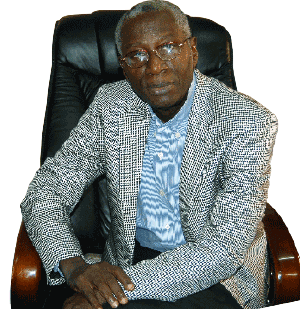TheNiche takes a look behind the mask of a cerebral advocate of an alternative economic position …..
THE CONCEPT of noblesse oblige propels Henry Boyo. Wikipedia defines Noblesse Oblige as ‘nobility obliges.’ Interpreted as ‘’…the concept that nobility extends beyond mere entitlements and requires the person with such status to fulfill social responsibilities, particularly in leadership roles…’
Boyo obviously believes that a privileged birth and upbringing comes with responsibilities. For this reason, he has rigorously opposed an economic policy, which has resulted in plunging living standards. The paradox arising here is that increased income has not elevated living standards, but led to the reverse.
Clearly, that paradox induces in the scion of Nigeria’s upper class a sense of duty. He feels a compelling need to reverse the bugbear of man-made poverty. Boyo’s head – start is revealed in his education. Igbobi College which he attended was an outstanding institution in that era. He also attended a revered British School Dulwich College in London. That the secondary school today charges 5,000 pounds a term as fees speaks for itself. This was topped up with Bachelors and Masters in, (you guessed) Economics.
The passion drives Boyo. The cartoon strip in the inset is culled from a booklet issued to drive home the point. Boyo considers the effort worthwhile. A lot of time, intellect and adrenaline have gone into driving the passion. It is all about, in his opinion,doing what is right to liberate the masses from abject poverty.
He had an option upon graduating in 1975 to have stayed in Europe. However with a functioning economy at home and the world the oyster of any Nigerian graduating in that era this option was not called into play. ‘Asides from the fact that it was home, my salary in UAC Nigeria as at that time was twice what I’ll get for working anywhere in England so it made sense for me to come back. The other facilities for me like car loans, no matter how qualified you are, you couldn’t get a job in England where the company will give you money to buy a car, to buy a ‘new’ car for that matter and at the same time give you a monthly allowance to enable you pay back the loan for the car and additionally provide you with more income for you to buy your petrol, change your tires and service your car. What could be better than that? In addition, you are in your own country.’ Alas, Boyo muses, today’s youth cannot access the same privileges. This he finds rather unfair.
Well, life itself said President John .F. Kennedy is unfair. Nevertheless, the critical issues in Boyo’s opinion reside not in our stars, but in us. It is, in his view incontrovertibly the result of misguided policies. Policies that are so irrational that the proverbial market mammy in Oyingbo or Mokola market wouldn’t touch with a long-pole.
For example, he goes to great lengths to point out that between 1975 and 1985(just before the Structural Adjustment Programme started) the country had less income, but in terms of purchasing power was certainly better off.
‘So, how come from 2011- 2013, when we had 10 times the income we had about 10-15 years ago. Why are we poorer? This is the anomaly, which was brought about because of a faulty monetary framework that unfortunately, worships the god of surplus cash, the god of excess liquidity. We have been worshipping and making offerings to the god of excess liquidity for about 20 years rather foolishly. Excess liquidity has become a god on its own that we must worship in spite of the very adverse collators that excess liquidity or surplus cash brings about.’
The devaluation has been catastrophic. It has destroyed purchasing power. This is because:
a. Nigeria’s major export, crude oil, is a commodity, which price is not dependent on the value of the naira;
b. Devalued currency is only beneficial to nations with competitive goods with other countries;
c. Naira devaluation is a tragedy, because devaluation from parity to the current N160=$1 could not have positive impact; however, naira’s loss of purchasing power has negatively impacted our economy, unjustly!
Since then, he postulates, a demonstrably faulty monetary framework centered on the worship of the deity known as ‘excess liquidity’ has come into play. It has turned out, to use the title of a famous book that exposed the futility of Stalinism published in 1945 ‘The God that Failed.’
Other gods have also come crashing down in the sub-plot. How about the bizarre concept of surplus cash? ‘I have a budget deficit and an income surplus.’ Weird! Can you beat that contradiction-in-terms?
The distortions wrought are horrendous driving by the blind adherence to bizarre policies. For example, how does a market woman work out the tenancy of giving our money free to the banks and then borrowing it back at excruciating cost? Even the ‘fuel subsidy’ is linked with the exchange rate of the Naira.
‘The reason we are not charging sales tax on petrol but instead we are paying subsidy is the result of a manipulation of the exchange rate between the naira and the dollar. For instance, if one litre of petrol worldwide costs one dollar, that means one litre of petrol equals one dollar and one dollar in Nigeria equals N160, in other words, one litre equals N160 basically in Nigeria. Now, you have a situation where as a result of re-orientation of the exchange rate mechanism that we use at the moment, now if we do that like I have been advocating , we now have the naira without any reference to the price of crude oil or whatever, but just because we now have a more appropriate mechanism for exchanging the naira, the naira rate becomes N80 to a dollar, nothing has changed in the world. It is still one litre equals’ one-dollar equals 80 naira because N80 is now one dollar for us. In other words, if you have one-litre equals’ one-dollar equals 80 naira and you are already selling at N97 per litre, why not keep selling at N97 per litre and take N17 as sales tax. The emphasis here is the exchange rate of the naira, it is the reason we are having to pay N3tr as subsidies instead of making for example a 10% tax on petrol, we are giving away a 50% subsidy all because of the Central Bank’s practice of capturing the dollar earnings and substituting the naira.’
His non-negotiable opposition to plunging living standards has also seen Boyo taking on the notion of ‘excess liquidity.’ This concept has come to stay in the Lexicon. Driven down the throat as a fait accompli.
From Boyo’s perspective this notion has become toxic. For example, in his perspective it has devastated wage income. It has done so in the following ways:
a. The CBN’s substitution of naira allocations for dollar-derived revenue unleashes hundreds of billions of fresh naira inflow into the coffers of the commercial banks; the banks, in turn, may leverage almost tenfold on the fresh inflow of naira, and create a specter of a cash surplus economy.
b. Consequently, the humongouscash surplus in the system is pitted against less goods and services. The market imbalance drives higher prices (i.e. fuels inflation)
c. Inevitably, incomes will buy less and less goods and services; i.e. higher incomes buy less because of the rising general price level. E.g., N18 000 wages can now only buy about half of what it could buy initially.
For his valiant attempt, Boyo has been largely ignored, or to use the old phrase, sent to Coventry. Surely won’t it be better to just have a two-hour debate with a man portrayed as a meddlesome interloper? A devastating knock-out punch will soon expose his inadequacies, surely? Boyo is enthusiastic about it and even salivates at the prospect.
‘If the subject of my advocacy is wrong, there is nothing stopping them from tearing my arguments into bits, but after 13-14 years of this thing, nobody has bothered to do that. They might make snide remarks, but they have never come to say we are not borrowing our money back. If anything, they have agreed that they are borrowing their money back. They have not said that excess liquidity does not impact negatively on inflation or on cost of borrowing, if anything they have actually admitted that in context we derail sector for the funds in the economy.’
Obviously, there is a great danger in this, one which the authorities clearly do not want to take. After all conversely it could all go horribly wrong. If this happens, the entire house could come cascading down.
In the meantime, the irrepressible Henry Boyo does his public duty bit and keeps, very admirably fighting on!











